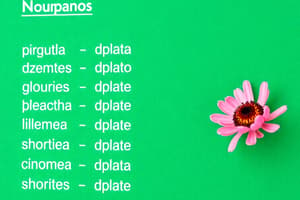Podcast
Questions and Answers
¿Cuál de los siguientes es un ejemplo de un sustantivo colectivo?
¿Cuál de los siguientes es un ejemplo de un sustantivo colectivo?
- Un automóvil
- La azucarilla
- Las abejas (correct)
- Un barco de crucería
¿Cuál de estos sustantivos representa un concepto intangible?
¿Cuál de estos sustantivos representa un concepto intangible?
- El amor (correct)
- La agua
- La azucarilla
- La rueda
¿Cuál de los siguientes es un ejemplo de un sustantivo propio?
¿Cuál de los siguientes es un ejemplo de un sustantivo propio?
- Un barco
- Una persona trabajadora
- Una persona famosa (correct)
- Las abejas
¿Cuál de estos sustantivos se considera un sustantivo concreto?
¿Cuál de estos sustantivos se considera un sustantivo concreto?
¿Cuál de los siguientes es un ejemplo de un sustantivo individual?
¿Cuál de los siguientes es un ejemplo de un sustantivo individual?
¿Cuál de estos sustantivos se considera un sustantivo común?
¿Cuál de estos sustantivos se considera un sustantivo común?
¿Cuál es la principal diferencia entre un sustantivo propio y un sustantivo común?
¿Cuál es la principal diferencia entre un sustantivo propio y un sustantivo común?
¿Cuál de las siguientes opciones representa un sustantivo propio?
¿Cuál de las siguientes opciones representa un sustantivo propio?
¿Cuál es la característica principal de un sustantivo individual?
¿Cuál es la característica principal de un sustantivo individual?
¿Qué tipo de sustantivo es 'amor'?
¿Qué tipo de sustantivo es 'amor'?
¿Cuál de las siguientes opciones es un sustantivo concreto?
¿Cuál de las siguientes opciones es un sustantivo concreto?
¿Cuál es una característica común de los sustantivos abstractos?
¿Cuál es una característica común de los sustantivos abstractos?
Flashcards are hidden until you start studying
Study Notes
Types of Nouns in Spanish
In Spanish, nouns are essential elements of the language. Like many languages, Spanish nouns identify people, animals, places, and things. Unlike English, all Spanish nouns have a gender—they can be masculine or feminine. Additionally, Spanish nouns have number, which refers to whether they are singular or plural. Let's delve deeper into the world of Spanish nouns, specifically focusing on the subtopics of the noun, its classes, and its properties.
Noun Definition
As previously mentioned, a noun in Spanish is a word that identifies people, animals, places, and things. These nouns can be further classified into various categories, including personal and common nouns, individual and collective nouns, and concrete and abstract nouns.
Sustantivo Propio vs. Común
Sustantivos propios (proprietary nouns) are proper nouns that identify individuals, institutions, or any concept that requires a proper name. On the other hand, sustantivos comunes (common nouns) are generic terms that signify people, animals, or things. Some examples of sustantivos propios include:
- Un nombre propio: Juan, Ana, o Francisco
- Una ciudad: Madrid, Barcelona, o Valencia
- Un país: Argentina o España
Common nouns are typically written with a small initial letter, and they represent general entities rather than specific instances. Examples include:
- Un barco: un barco de crucería o un barco que transporta mercancías
- Una persona: una persona trabajadora o una persona famosa
Sustantivo Individual vs. Colectivo
Sustantivos individuales (individual nouns) are used to describe single, specific entities within a broader category. These singular nouns indicate an individual instance of something larger. For instance:
- Un automóvil es un objeto coleccionable (A car can be considered a collectible item.)
On the contrary, sustantivos colectivos (collective nouns) denote a group or collection of items, rather than individual ones. These nouns are generally used to discuss aggregates, swarms, or collections, such as:
- Las abejas son insectos coleccionables. (Bees can be considered collectible insects.)
Sustantivo Concreto vs. Abstracto
Concrete nouns (sustantivos concretos) are tangible objects that exist in reality, allowing us to interact with them using our senses. Some examples of concrete nouns include:
- La agua: Something we can touch, taste, and see.
- La rueda: An object we can observe and handle.
- La azucarilla: Something we can touch and taste.
Abstract nouns (sustantivos abstractos), on the other hand, do not have physical substance. Instead, they represent intangible concepts or emotions, such as love, hate, or sadness. Examples include:
- El amor: An emotion we experience but cannot physically hold.
- La tristeza: Another emotion we can sense but not touch.
- La inteligencia: A quality that exists but cannot be touched or seen.
In summary, Spanish nouns play a crucial role in conveying information and expressing ideas. By understanding the differences between personal and common nouns, individual and collective nouns, and concrete and abstract nouns, you can effectively communicate in Spanish and navigate the language with ease.
Studying That Suits You
Use AI to generate personalized quizzes and flashcards to suit your learning preferences.




